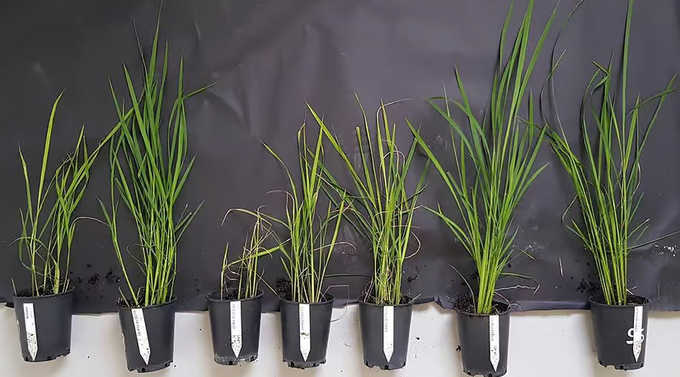November 27, 2025 | 23:59 GMT +7
November 27, 2025 | 23:59 GMT +7
Hotline: 0913.378.918
November 27, 2025 | 23:59 GMT +7
Hotline: 0913.378.918

Various rice plants, both control plants and mutants, between three and four weeks after inoculation. Photo: IRD / Laurence Albar
The development of the resistant variety, described in a new paper in the journal Plant Biotechnology, is just the first step towards generating resistant, locally adapted varieties for food producers in Africa.
Rice yellow mottle virus (RYMV) is spread by mammals and insects and direct leaf-to-leaf contact. In Africa, the majority of farm plots are less than one hectare in size, and between 10-100% of the rice harvests are regularly lost to the virus.
“The only real protection is to develop rice varieties that possess a resistance gene against RYMV, which would make the plant invulnerable,” says Dr Yugander Arra of Heinrich Heine University Düsseldorf (HHU), Germany, and lead author of the study.
Mutations in just 3 genes – RYMV1, RYMV2, and RYMV3 – are already known to achieve resistance. For example, the resistant form rymv2 naturally occurs in Oryza glaberrima varieties – a domesticated African rice. But unfortunately it produces poor yields.
“This resistance trait is attributable to the loss of a gene function that is not essential. If we switch the gene off completely, the plants behave normally. However, as a result of the loss of the gene function, they are resistant to the virus,” says Dr Wolf Frommer, who heads The Institute for Molecular Physiology at HHU.
The mutation is rare in the high-yielding Oryza sativa, which is by far the most cultivated rice species in Africa, so the researchers wanted to see whether resistance could be introduced to a variety of O. sativa using the CRISPR/Cas genome editing method.
Their results confirm that disrupting the RYMVR gene in the Kitaake variety, a Japonica rice variety, confers resistance without penalising its high yield, at least under greenhouse conditions.
“The next step will be to edit [the mutation] in elite varieties that are better adapted to rice culture in rainfed lowland and irrigated areas of Africa, where rice production is particularly affected by RYMV disease,” the authors write.
“Subsequently, field trials will be required to validate that resistance is maintained under the local conditions in Africa, and to evaluate possible penalties in the relevant agro-ecosystems.”
cosmosmagazine

(VAN) A new study reveals how the simultaneous effects of ocean acidification, salinity and loss of oxygen are making the world more fragile.

(VAN) Hopes are growing that the creation of the first 3D turkey gut model could be a turning point in the battle against the virulent blackhead disease.

(VAN) Tyson, America’s biggest meat supplier, plans to shutter one of its largest beef processing plants as the industry continues to struggle with low cattle supplies and political pressure from Washington.

(VAN) New FAO study shows how digital solutions are empowering farmers and fishers to prevent losses and build resilient agrifood systems.

(VAN) Brazil's COP30 presidency pushed through a compromise climate deal on Saturday that would boost finance for poor nations coping with global warming but that omitted any mention of the fossil fuels driving it.

(VAN) Poultry farmers in the UK have been warned that they could face one of the worst winters yet for bird flu.

(VAN) Prices of main-crop paddy have risen sharply, with jasmine rice hitting 16,100 baht per tonne — the highest level in years.